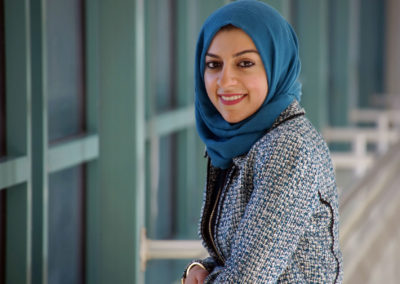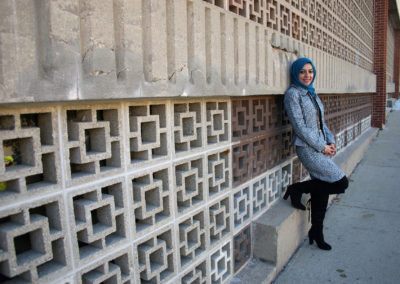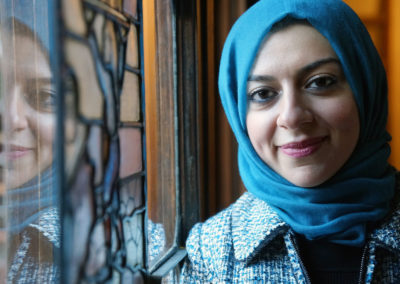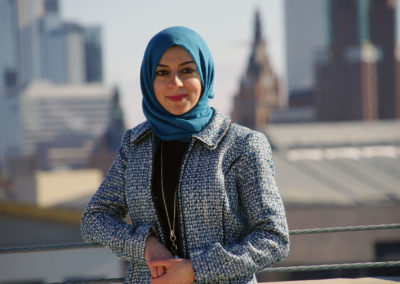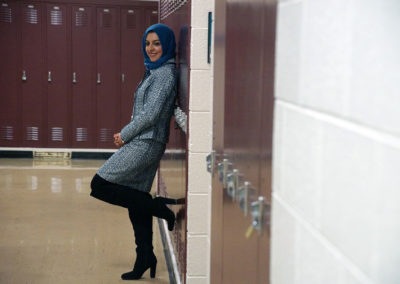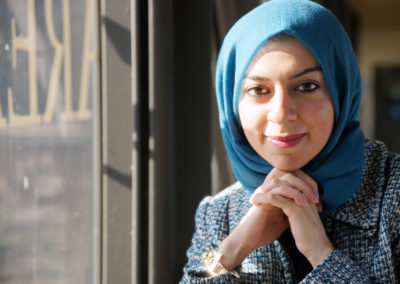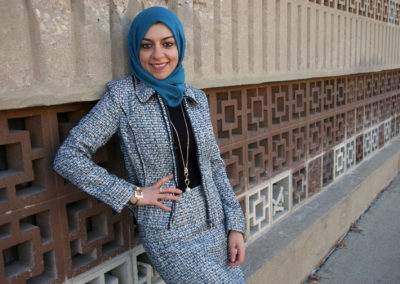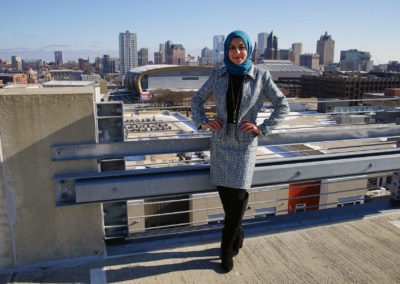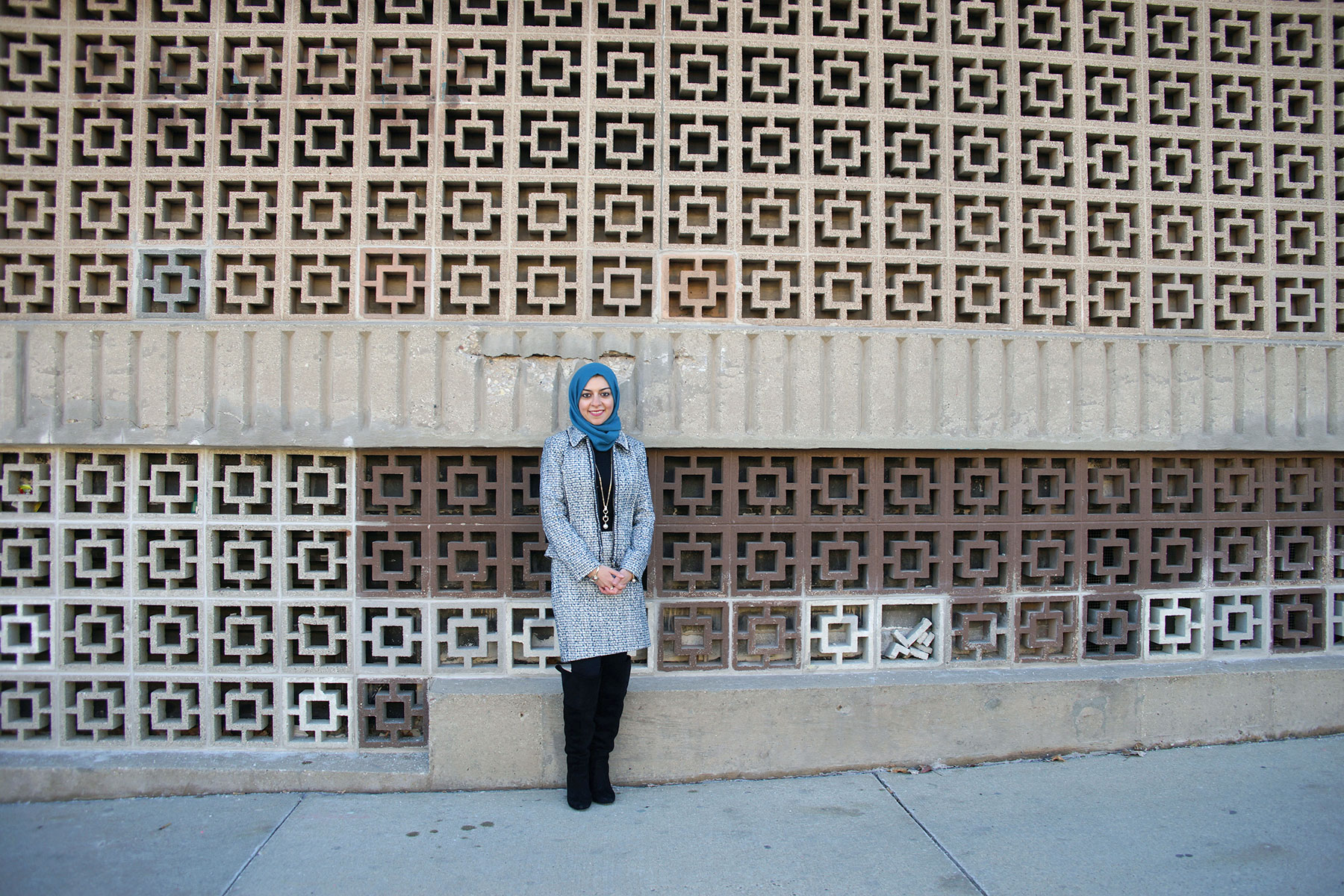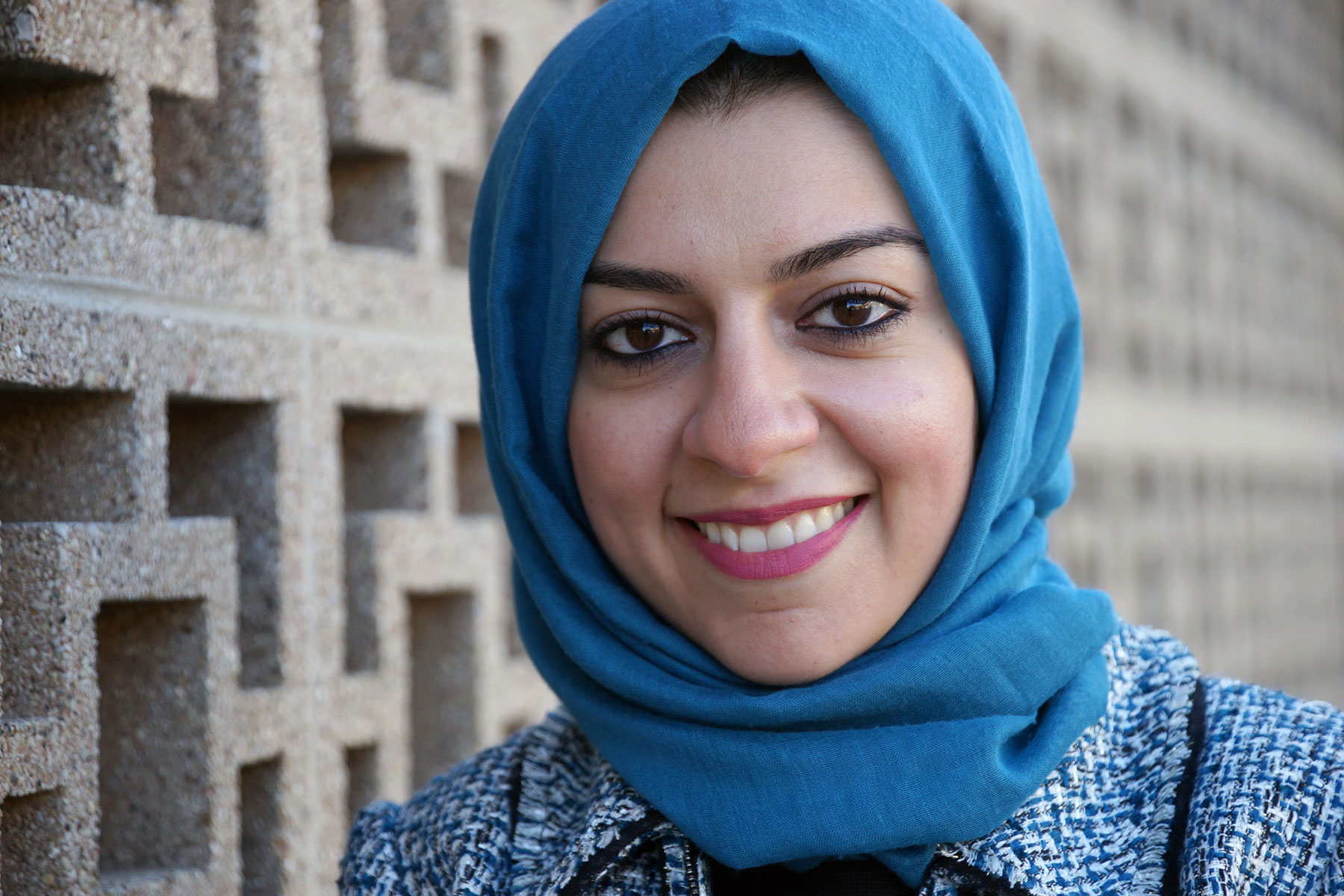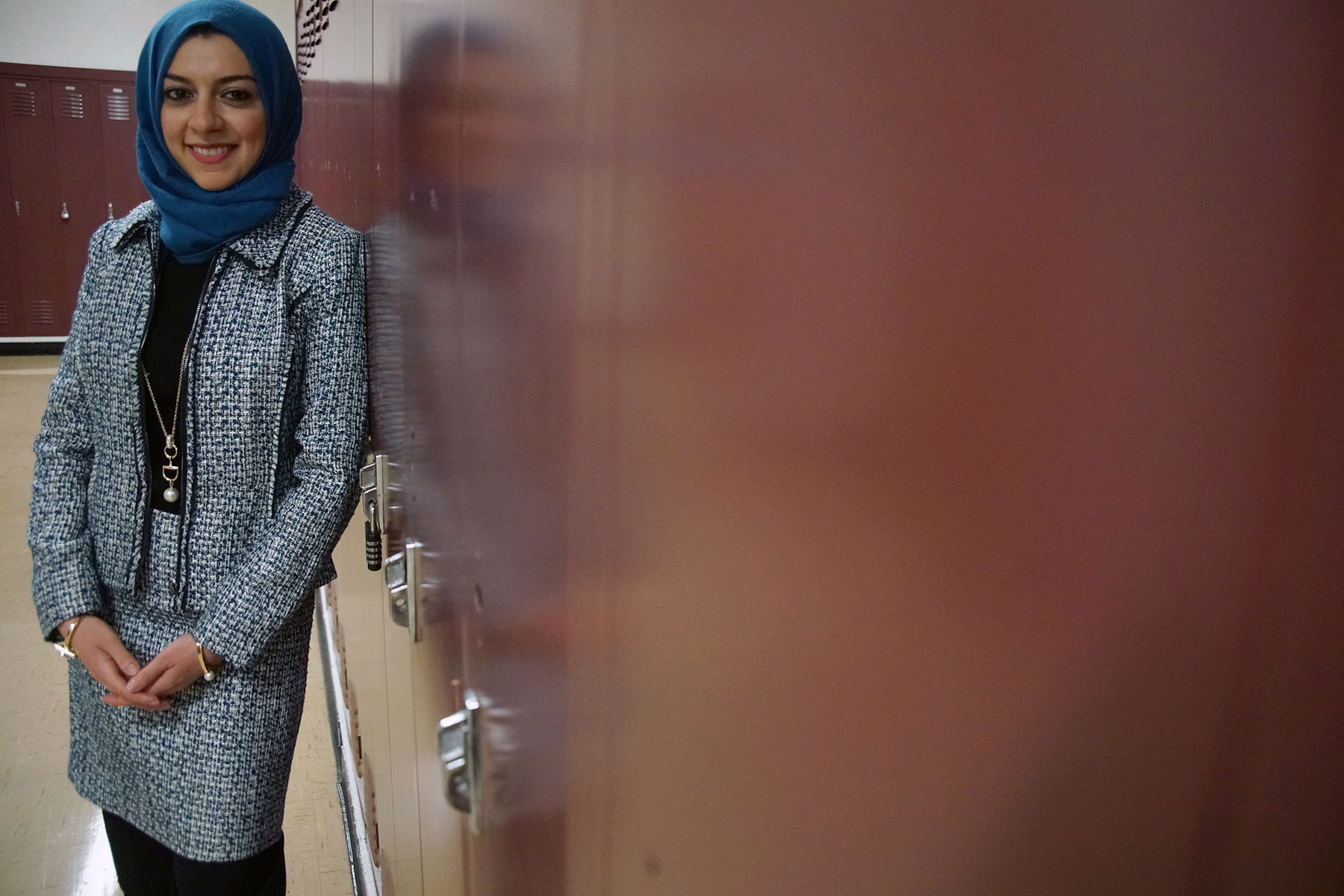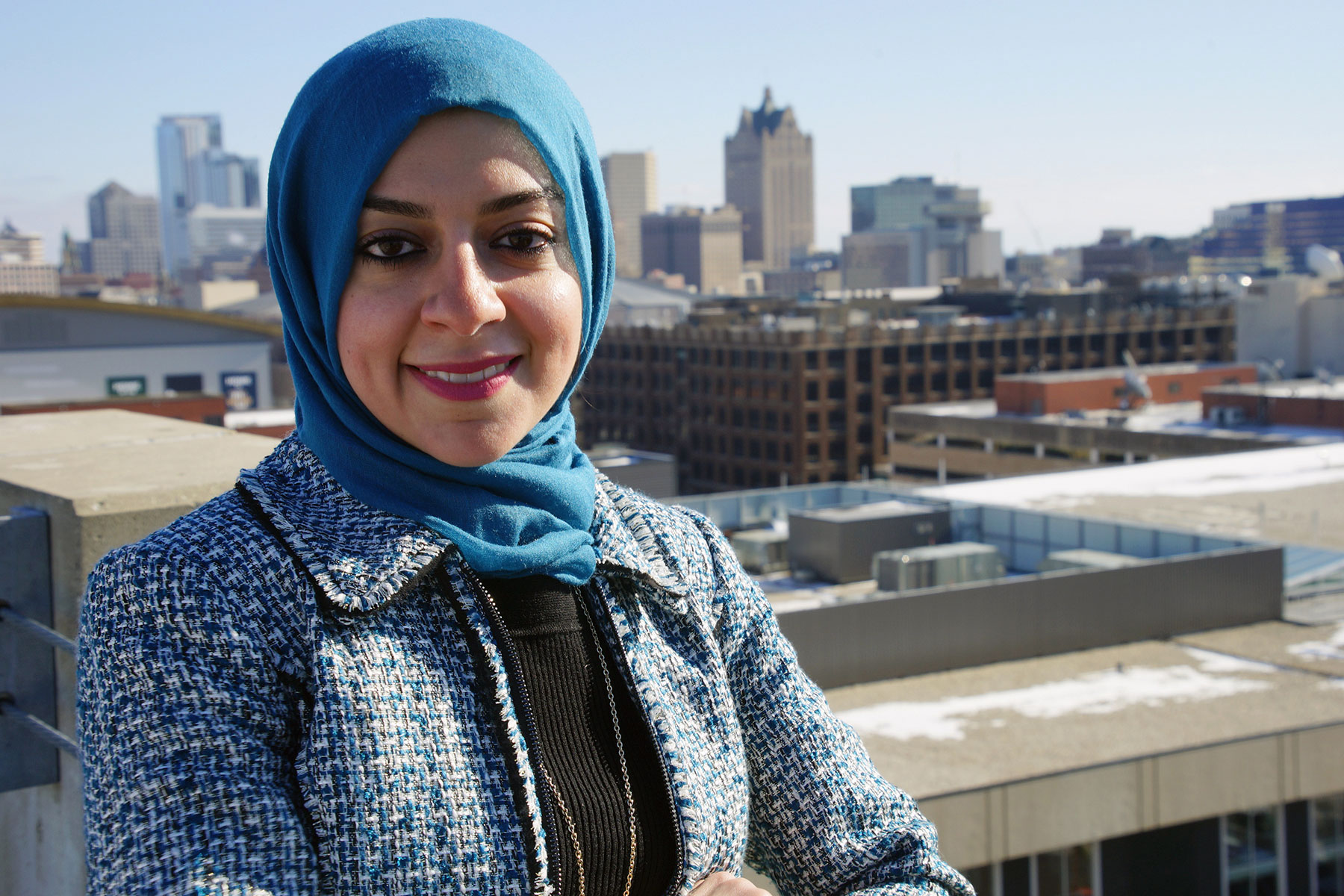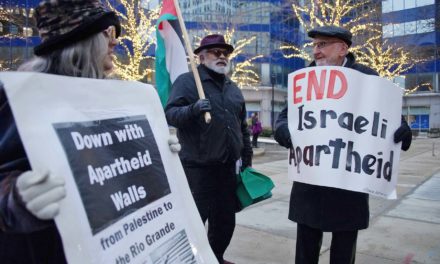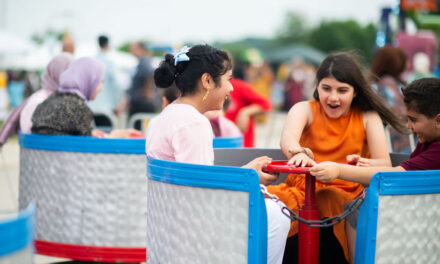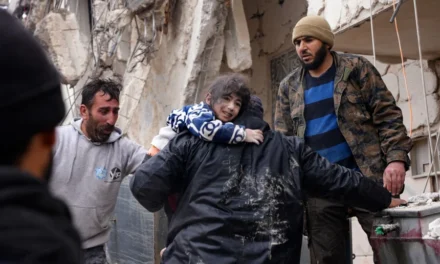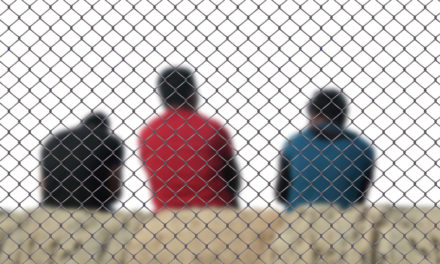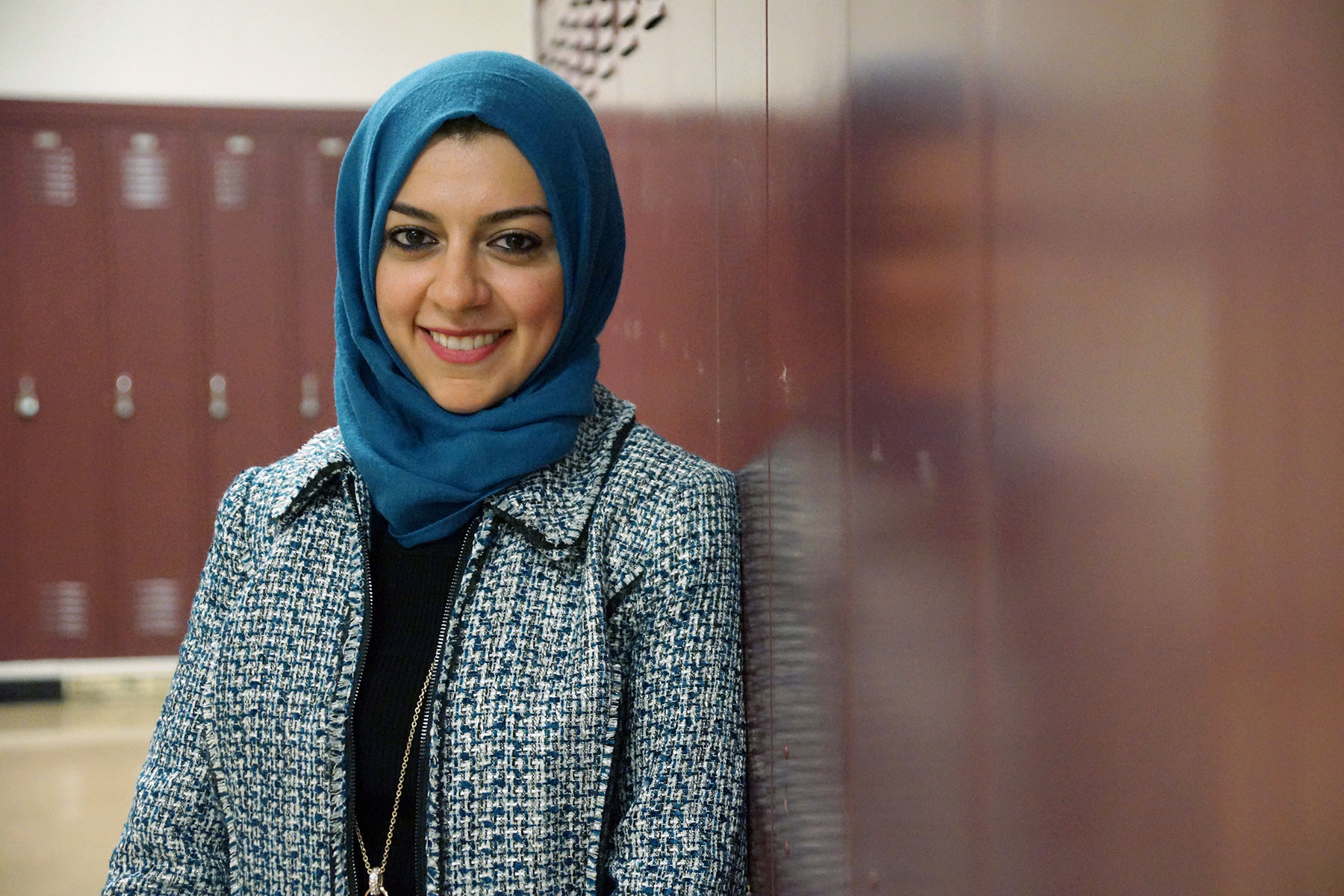
This interview is part of an ongoing editorial series. Each segment highlights a woman in the Wisconsin community. The stories are intended to share personal struggles, public achievements, and the social complexities with their Muslim identity.
Using education as a tool to navigate obstacles and advance in life, Bara Omari has dedicated her career to overcoming perceptions of Muslims and women as an example for others.
In her ESL (English as a Second Language) work, Omari assists international students to develop their communication skills so they can find their place in the Milwaukee community. Wearing her faith on her head, she uses education to open doors of opportunity for herself and others, translating knowledge into power and striving to inspire a generation of young Muslim girls to attain that strength and use it for good.
Q&A with Bara Omari
Wisconsin Muslim Journal: What is your fondest experience from growing up in Milwaukee?
Bara Omari: My fondest experiences from growing up are around the East Side and Shorewood. The most distinct are those from Lake Michigan with my family. Rain or shine, we spent a lot of time as a family grilling or sharing meals at Veteran’s Park or Lake Park. If my dad wasn’t grilling, my mom would often cook at home, then pack the food and my siblings and I in the car, and drive us down to the lakefront for lunch or dinner.
Wisconsin Muslim Journal: Who was the most influential person during your youth and why? Do you still feel that impact today?
Bara Omari: My father was the most influential person in my life. I have always been really close to him. My siblings often joked that they couldn’t share anything with me out of fear or worry that I’d overshare something with him. That impact still exists today. You could say I followed in his footsteps – we’re both educators at Milwaukee Area Technical College (MATC).
Wisconsin Muslim Journal: What do you think would surprise people to know about you?
Bara Omari: It depends on the group of people I’m surrounded by. One of my favorite hobbies is reading and I don’t think that surprises people very much. Many are most often surprised by my personality. When they see a veiled Muslim woman, people tend to expect a reserved and shy person. What they get is quite often the opposite of that.
My ESL students are often surprised by the languages I speak. I speak four languages – Arabic, English, French, and Spanish. If students I first meet are speaking a language that I understand, I don’t speak with them in their native tongue. It forces them to use English.
Wisconsin Muslim Journal: As a Muslim woman, are you exposed to personal bias? And if so, is it more due to gender, faith, or both?
Bara Omari: As a Muslim woman of color who wears hijab, personal bias is all around me. I think it’s due to a number of things, certainly my gender and my very physically apparent faith, but also my heritage and my skin. Whether at work or around town, I see the many facades of people around me, both positive and negative. Many of my experiences throughout my childhood and adulthood in Milwaukee are positive. I think it helps to have lived in the same community for years.
Wisconsin Muslim Journal: How did you become interested to work in academia, and what led to your current position?
Bara Omari: It was a culmination of events and experiences that led me to work in academia and my current position. Most importantly, education was always emphasized in my household growing up. Someone was always in school, either working towards a degree or teaching. My parents instilled the importance of education in me very early. When asking for permission to do something, most kids heard phrases like “After you eat dinner,” or “If you finish all your chores.” For me, it was phrases like, “After you finish homework/school/a degree/another degree.” To advance in life, I needed an education and it was that education that helped lead me to my current position. Even today, the importance of education is prevalent in my family. My sister is pursuing a graduate degree in a field that isn’t relevant to her undergraduate degree, my aunt is finishing a degree at MATC after over 30 years of being out of school, just to name a few examples.
That foundation and further experiences paved my path. I always had a few professions in mind that I thought of pursuing. Teaching stood out to me in my elementary years and through graduate school. From the great teachers I had in the Shorewood School system to the looks on people’s faces once something clicked after I tutored them, to the comfort and ease in which I commanded a college classroom. The more exposure I had, the more I enjoyed it.
Wisconsin Muslim Journal: What do you see as the biggest challenge students have when learning English as a second language?
Bara Omari: The biggest challenges when learning English as a second language are often the obstacles surrounding students. That includes acclimating to a new city and country, poverty, and lack of opportunity. For example, I think learning English in Milwaukee itself is the biggest challenge. Milwaukee has long been known for its segregation. That segregation pours over into other minority groups. There are a number of different pockets of communities across the Milwaukee area. Immigrants in those communities are usually able to attend religious services, take classes, go to the grocery store, go out to eat, etc. all in their native tongue. I see this within the Muslim community on a regular basis. They can survive without using English, which then makes their language learning journey even more challenging. In some cases, the only English exposure students receive is that exposure in their classes.
Wisconsin Muslim Journal: What role does your faith play in the work that you do?
Bara Omari: I wear my faith on my head. As a result, I’m consciously aware of the perceptions that exist around me and towards me. Given the negative media coverage and overwhelmingly inaccurate misconceptions, I strive to portray Muslims in a more positive light. My hijab reminds me that the world needs to see more Muslims doing random acts of kindness, containing our road rage when someone cuts us off, smiling, or holding doors open for strangers.
Prophet Muhammad was seen as someone who was loving, kind, and compassionate. One of his quotes include: “Kindness is a mark of faith and whoever has not kindness has not faith.” It’s similar to a quote that I have on my office wall: “Whoever you are, be a kind one.” My faith reminds me to show kindness and compassion in my character in everything that I do and break those barriers that exist towards Muslims.
Wisconsin Muslim Journal: What is the question you are most often asked?
Bara Omari: “Where are you from?” followed by “What language(s) do you speak?” Given my appearance, I’m often mistaken for the ESL student and not the instructor. When I began teaching at MATC, I even had students question if I had completed high school. This makes for an entertaining experience.
Wisconsin Muslim Journal: What do you consider to be your greatest accomplishment, and what goal are you still reaching for?
Bara Omari: My greatest accomplishment is simply being me. That includes my advancement in my academic and professional lives. With all the negativity and misconceptions that are portrayed about Muslim women, I’ve successfully broken down walls, barriers, and overcome stereotypes and misconceptions in different aspects of my life, and have proved many people to be wrong. I think it’s even why you’re interviewing me. One conversation led to this interview. Many equate being a Muslim woman with being oppressed, reserved, shy, submissive. I’m a Muslim woman and I’m educated. I’m a Muslim woman and I’m successful. I’m a Muslim woman and I have a social life. I’m a Muslim woman and I’m resistant to many stereotypes.
I’m still reaching for breaking more barriers and showing that Muslim women have a well-deserved place in this society and community. That to be Muslim and female doesn’t come with reservations. That to be Muslim and female means we can conquer what we aspire to, regardless of the barriers we’re faced with. That we can live in a world where Muslim and female equates to free will, free spirit, advancement, and success.
Wisconsin Muslim Journal: If you could send two messages in time, one 20 years ago and the other 20 in the future, what advice would you give your young self? And, what question would you ask the older version of yourself?
Bara Omari: I would tell my younger self that life isn’t so serious and regimented. I would ask the older version: Is it really necessary to always keep everything clean? What’s the most important thing in life?
Wisconsin Muslim Journal: What advice would you give to young Muslim girls in Milwaukee about their education?
Bara Omari: Education opens many doors of opportunity. Opportunity to learn about the world. Opportunity to advance in the world. Opportunity to learn about ourselves. As Muslim women, we’re constantly being told by others who we are or who we should be, albeit some of those who tell us who we should be are well-intentioned. Education allows us to learn not only about the world around us, but about ourselves as well. Even if you don’t necessarily enjoy learning, there is always something to be learned. Education is a culmination of information. Information is knowledge. Knowledge is power. We need more Muslim girls with power.
